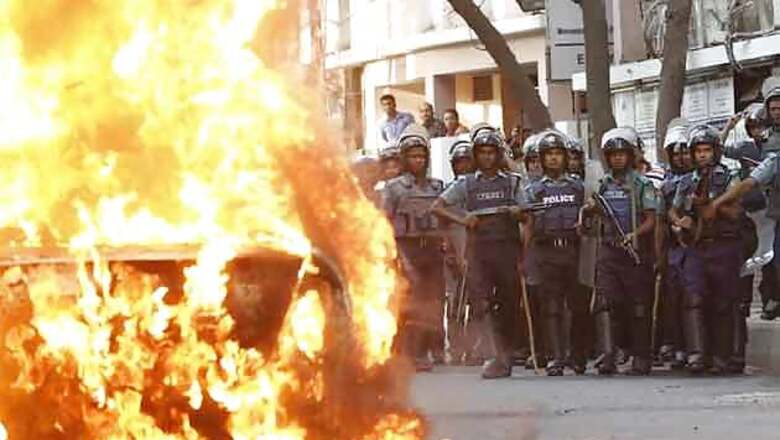
views
Dhaka: Twenty one more people have been killed in clashes between Jamaat-e-Islami (JI) supporters and police taking the toll to about 80 after a tribunal awarded death penalty to Islamist leader Delwar Hossain Sayedee for 1971 war crimes. A two-day strike called by JI that started on Sunday coincided with President Pranab Mukherjee's maiden visit to the country.
Meanwhile, Bangladesh's key Opposition leader Khaleda Zia cancelled her meeting with the President citing security reasons. Another shutdown has been called by the fundamentalist outfit's alliance partner and main opposition Bangladesh Nationalist Party led by Khaleda Zia on the last day of the visit by Mukherjee on March 5.
Authorities called army troops in north-western Bogra as JI activists attacked a police station with homemade bombs and guns at the cantonment area. "Two platoon troops were deployed on request from the local administration as the violence erupted at the cantonment area," an army spokesman said.
The death toll in the clashes over the war crimes verdicts has risen to about 80 since the first conviction was made on January 21. Twenty one people, including a police constable, were killed and about 50 others were injured in the violence that rocked the first day of the strike called by Jamaat.
Activists of Jamaat-e-Islami and Islami Chhatra Shibir clashed with the police in the districts of Bogra, Joypurhat, Jhenaidah and Rajshahi districts throughout the day. Of those killed, nine died in early morning clash in three upazilas of Bogra while six in two upazilas of Joypurhat during Jamaat-called 48-hour shutdown, the Daily Star reported.
Two, including a young boy, were killed in a gunfight between Jamaat-Shibir men and police in Godagari upazila of Rajshahi while a police constable was killed in clash with Jamaat-Shibir in Jhenidah. A Jamaat man died when Border Guard Bangladesh personnel opened fire on marauding Jamaat-Shibir activists after being attacked in Satkhira.
Two more people were killed in clashes between police and Jamaat members in other parts of the country, media reports said. JI activists overnight torched a train and attacked several police installations in northwestern Bangladesh as they enforced a nationwide 48-hour stoppage to halt ongoing trial of their leaders. Most of the violence victims were JI activists.
Sayedee was the third JI politician to be convicted by the International Crimes Tribunal since the trial of war crimes suspects, mostly belonging to the Islamist group, began three years ago. In the first verdict of the tribunal on January 21, former Jamaat leader Abul Kalam Azad was sentenced to death on similar charges.
Another Jamaat leader Abdul Quader Mollah was sentenced to life in February for atrocities during the war. Main opposition Bangladesh Nationalist Party (BNP) has extended its support to its crucial extreme right-wing ally, which was opposed to the countries 1971 independence siding with the then Pakistani junta, questioning the "neutrality" of the war crimes trial.
BNP, however, did not extend its moral support for the 48-hour JI shutdown unlike previous such occasions. BNP chief and ex-premier Khaleda Zia has called the violence a "genocide" carried out by law enforcement agencies.
However, Information minister Hassanul Haque Inu told reporters here, "Police did never attack any unarmed person. In every incident Jamaat hoodlums were the attackers. They launched attacks on police . . . torched mosques, houses of the Hindu community and their temples."
Reports said suspected extreme right-wing activists also set ablaze a Hindu temple and attacked two local leaders of ruling Awami League who were followers of Hindu faith at southwestern Bagerhat and ransacked another temple at suburban Gazipur district on Saturday. Meanwhile, thousands of "non-partisan" youths continued to stage demonstrations in the capital and several other major cities demanding ban on JI and capital punishment of their top leaders for 1971 crimes siding with Pakistani troops.
Jamaat-e-Islami, the largest Islamic party in Muslim-majority Bangladesh, was opposed to Bangladesh's 1971 Liberation War when officially 3 million people were killed.
(With Additional Inputs from PTI)















Comments
0 comment